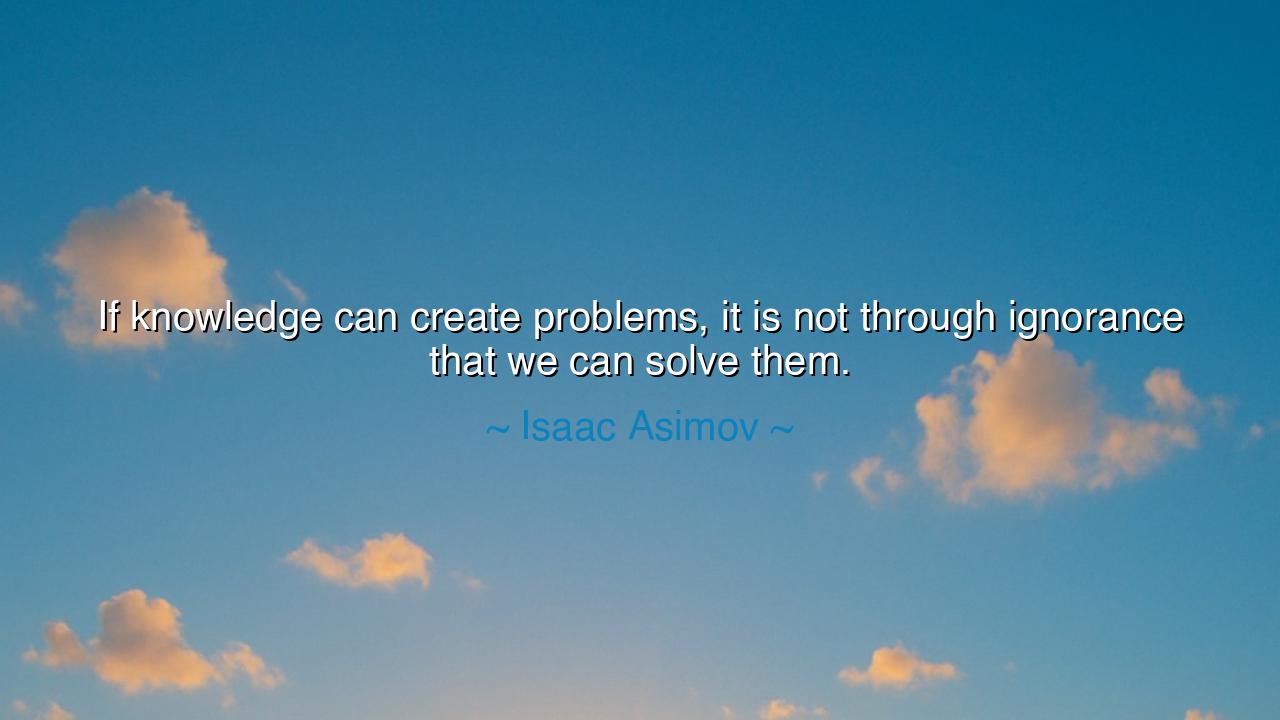
If knowledge can create problems, it is not through ignorance






Hear the words of Isaac Asimov, the master of science and imagination, who proclaimed: “If knowledge can create problems, it is not through ignorance that we can solve them.” This truth cuts sharp as a sword, for it speaks to the dual nature of knowledge. What empowers us can also endanger us; the very fire that warms our homes can burn them down. Yet Asimov warns that to extinguish this fire by returning to ignorance is folly. If wisdom creates the storm, then only deeper wisdom can calm it.
The ancients understood this paradox. When Prometheus stole fire from the gods, mankind was both blessed and cursed. With fire came warmth, light, and progress—but also destruction, war, and fear. Did the answer lie in abandoning fire? No—it lay in mastering it, learning to wield it wisely. So too with every form of knowledge: the danger is not in its existence, but in its misuse. The answer is never to blind ourselves, but to see more clearly.
History gives us vivid proof. The discovery of nuclear power brought both boundless energy and terrifying weapons. The mushroom cloud over Hiroshima and Nagasaki showed that knowledge could indeed create problems of unimaginable scale. Yet the solution was never to retreat into ignorance, pretending such knowledge did not exist. Instead, humanity was forced to wrestle with treaties, safeguards, and ethics—to apply wisdom, restraint, and foresight. Only more understanding, not less, could prevent annihilation.
And so it is in every age. Diseases once thought incurable were unleashed upon mankind—but through deeper knowledge, cures and vaccines arose. The plagues of the Middle Ages could not be ended by closing the eyes and calling it fate; only the study of medicine, the advance of learning, could bring relief. To turn from knowledge in the face of crisis is to choose slavery to fear. To embrace it, refine it, and grow through it is to walk the path of freedom.
Asimov’s words also strike against the arrogance of those who scorn learning, imagining that ignorance is safety. It is not. To refuse knowledge is to stumble blindly while danger grows unseen. A society that rejects learning cannot solve the challenges of its time; it can only decay. The farmer who will not learn new methods starves; the ruler who refuses counsel leads his people to ruin. Only those who embrace deeper understanding can overcome the very perils that knowledge itself may bring.
The lesson, then, is this: do not fear knowledge because it carries risks, but fear ignorance because it carries only death. When faced with problems born of progress—whether in science, in politics, or in life—do not close your eyes. Open them wider. Ask harder questions. Seek wiser teachers. The answer is not to know less, but to know more, to temper power with wisdom, and to shape discovery with conscience.
Therefore, let your practice be this: when confronted with the problems of your time, do not retreat into denial. Instead, study. Learn. Engage. If your tools cause harm, do not cast them aside, but sharpen them with wisdom. If your knowledge brings danger, seek higher knowledge to guide it toward good. For as Asimov reminds us, only through deeper understanding can we heal the wounds of understanding. Ignorance cannot save us—it can only enslave us. Knowledge alone holds the keys to both peril and redemption.






AAdministratorAdministrator
Welcome, honored guests. Please leave a comment, we will respond soon